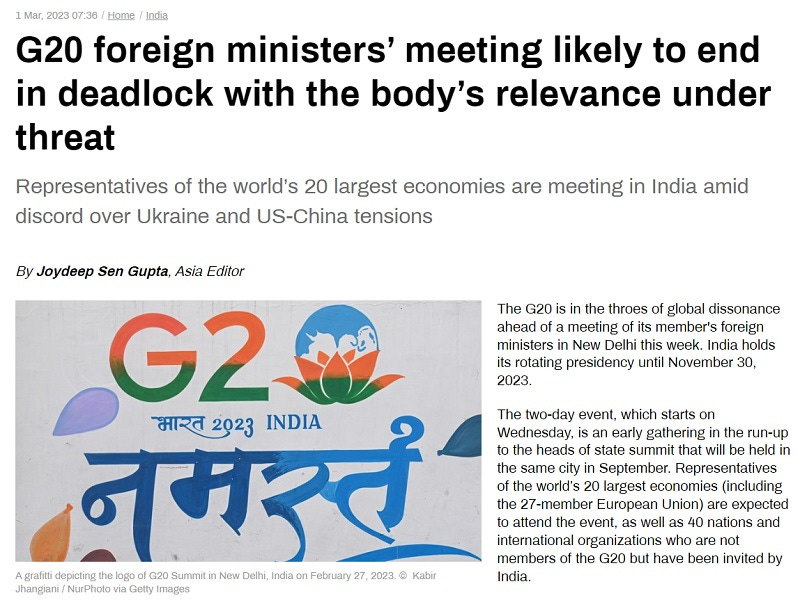Global Fora Like The UN & G20 Are Gradually Losing Their Importance
The gradual loss of global fora’s importance will lead to the growing importance of interests-based and regional ones like BRICS and the SCO respectively, among others like January’s Indian-hosted virtual Voice Of Global South Summit. These categories of groups have a much greater chance of actually agreeing on meaningful cooperation that tangibly makes a difference, thus leading to them serving as engines for socio-economic, political, and security developments.
RT’s Asia editor Joydeep Sen Gupta published a thought-provoking piece on Wednesday declaring that “G20 foreign ministers’ meeting likely to end in deadlock with the body’s relevance under threat”. The primary point made therein is that the growing polarization brought about by the New Cold War, which unprecedentedly intensified after the start of Russia’s special operation last year as well as last month’s Sino-American balloon incident, has resulted in the G20 gradually losing its importance.
It's practically impossible to expect the US-led West’s Golden Billion and the Sino-Russo Entente to agree on anything, thus likely resulting in this year’s Indian-hosted events failing to have any meaningful significance. This “Great Bifurcation” between those two de facto blocs, which would be unprecedentedly exacerbated if the West sanctions China in the event that the latter arms Russia, has created space for India to lead a third pole of influence comprising the Global South.
This informal new Non-Aligned Movement (“Neo-NAM”), which also includes equally independent and sovereign Great Powers like Turkiye among several others, doesn’t want to take sides in the worldwide competition between those two over the direction of the global systemic transition. They obviously factor its evolution towards more complex multipolarity (“multiplexity”) like the Sino-Russian Entente is seeking to accelerate, but they also don’t want to position themselves as enemies of the West either.
To that end, they’re reluctant to support either side, thus further extending credence to the prediction that the New Cold War will paralyze global fora like the G20 with deadlock for the indefinite future. The UN also isn’t immune from this trend either, with even Russian presidential spokesman Dmitry Peskov opining in a recent interview that this body is losing its importance in the face of the Golden Billion’s illegal sanctions that are advanced outside the authority of the UN Security Council.
Nevertheless, President Putin’s official representative also said that the UN still retains a central role in helping to balance and stabilize global affairs, which can be said about the G20 and other increasingly deadlocked global fora as well. The reason for his assessment is that these platforms bring opposing parties together to share their views with one another and third parties too, which is important for them all to do despite the likelihood that they won’t ever agree on much of anything meaningful anymore.
The gradual loss of global fora’s importance will lead to the growing importance of interests-based and regional ones like BRICS and the SCO respectively, among others like January’s Indian-hosted virtual Voice Of Global South Summit. These categories of groups have a much greater chance of actually agreeing on meaningful cooperation that tangibly makes a difference, thus leading to them serving as engines for socio-economic, political, and security developments.
With these trends in mind, it might be tempting for some observers to conclude that globalization has ended and is being replaced with regionalization, but that’s not an entirely accurate assessment. The previous model of Western-centric globalization has indeed been dealt a deathblow by the past year’s events after having already had its viability threatened by the trade war and COVID-19, but what’s rising in its place is a regionally driven form of non-Western-centric globalization, which represents a hybrid.
On the one hand, there’s indeed an inverse relationship between the gradual loss of global fora’s influence and the growing importance of interests-based and regional ones, but on the other, this second-mentioned category of groups can also potentially have a global reach. BRICS and the Voice Of Global South Summit serve as direct examples of this, while more regionally focused platforms like the SCO can cooperate with counterparts abroad like the African Union (AU) in order to extend their reach.
It would therefore be more accurate to say that everything’s moving in the direction of comparatively more decentralized and regionally driven non-Western-centric globalization instead of simply regionalization or non-Western-centric globalization in and of themselves. This hybrid model might even arguably be much more effective than that which it’s replacing since those actors within it have greater sovereignty, overlapping visions, and the political will to make tangible progress on the latter.



Aren't the BRICS also a global forum?
I think they are the first attempt of what the author calls the Russia-China entente to extend into what Western specialists call the "emerging countries" with India, South Africa and Brazil, apart from all the candidates to join, such as Saudi Arabia, Algeria and Argentina.
For now, however, its problem is a lack of political cohesion in the case of Brazil and a greater real geopolitical and geoeconomic weight in the case of South Africa.